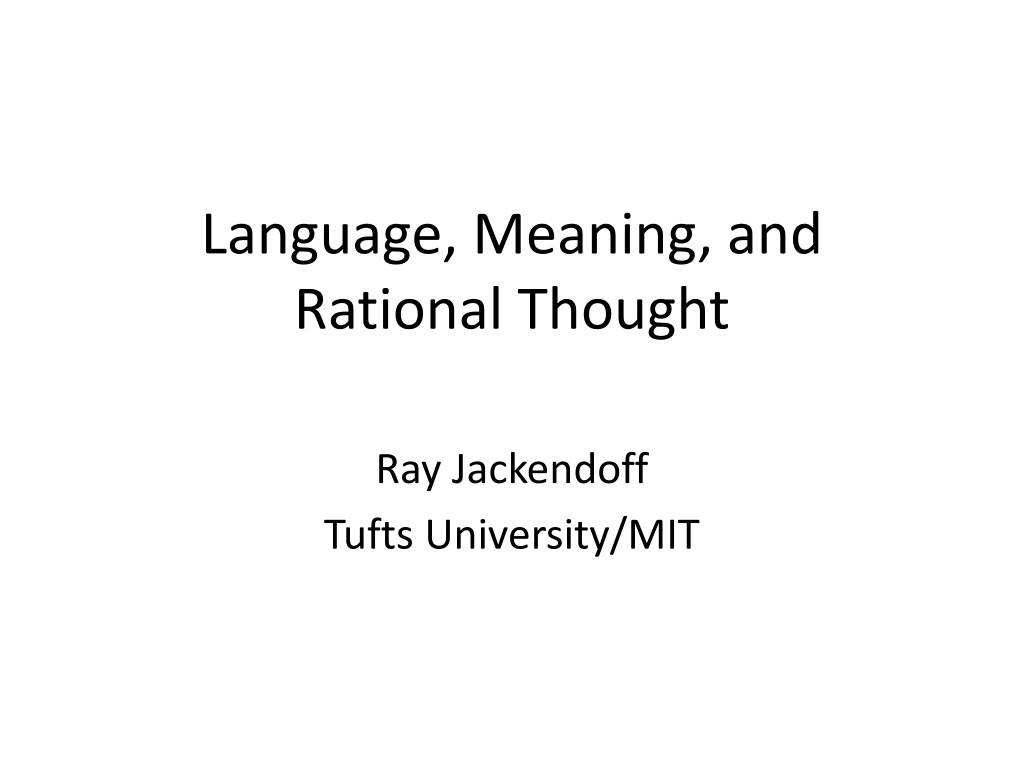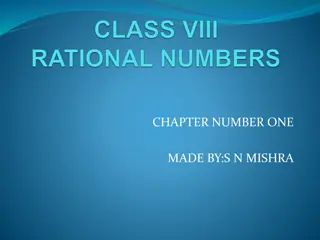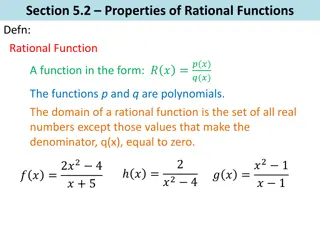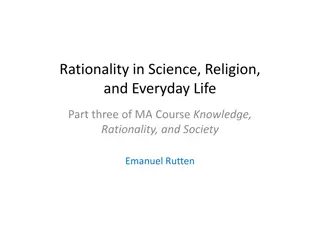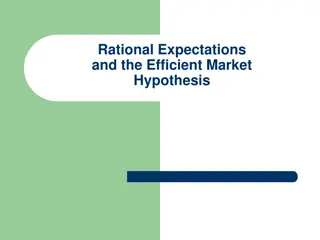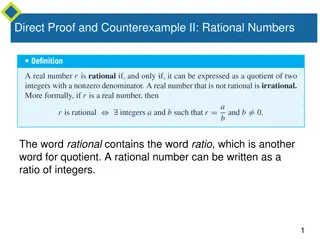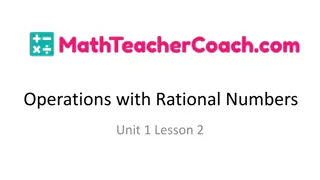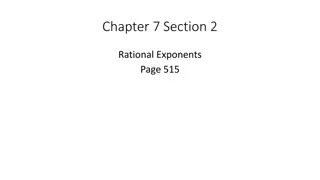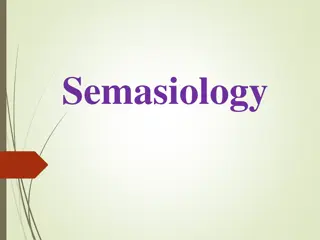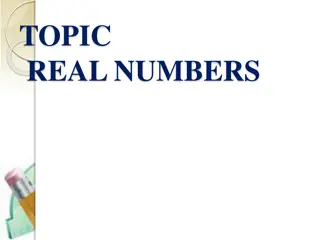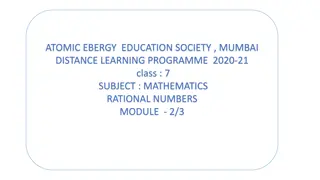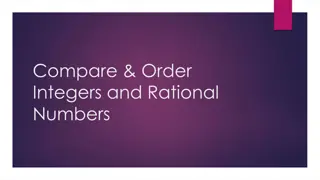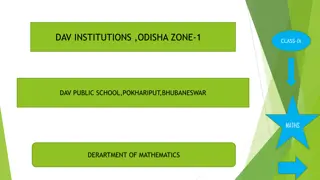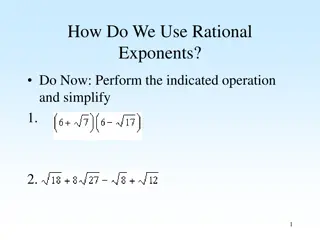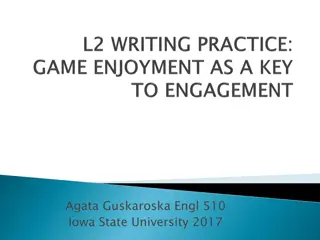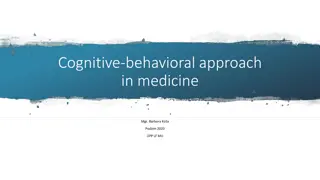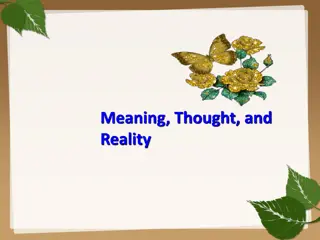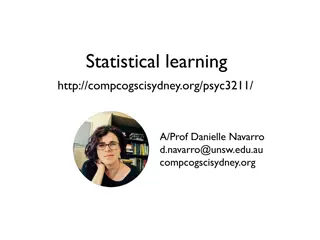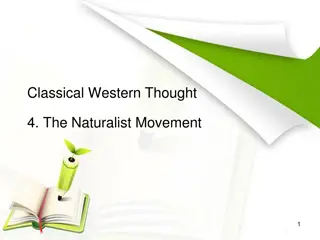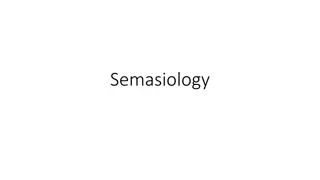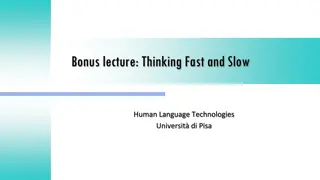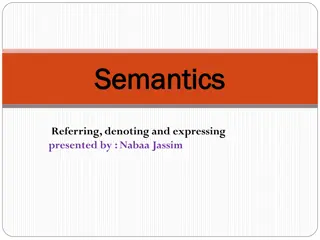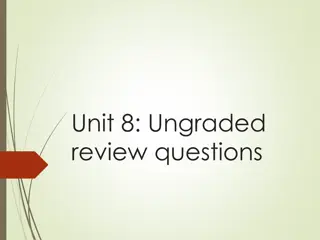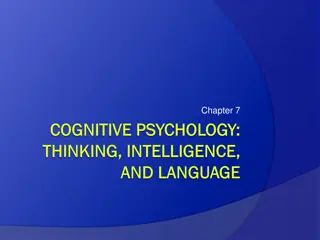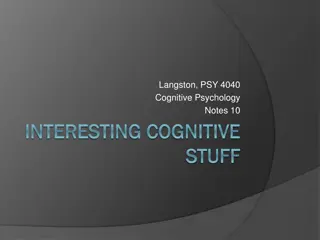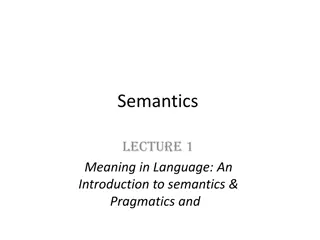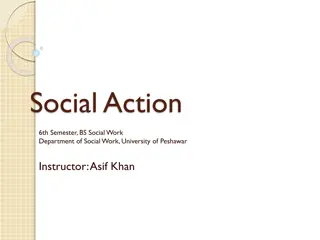Exploring Language, Meaning, and Rational Thought in Cognitive Science
Dive into the intriguing realm of thought processes and inner speech as discussed by prominent scholars such as Plato, John B. Watson, Peter Carruthers, Noam Chomsky, and Ludwig Wittgenstein. Discover varying perspectives on how language intertwines with our conscious thoughts, challenging conventional notions of communication and shedding light on the complex nature of human cognition.
Download Presentation

Please find below an Image/Link to download the presentation.
The content on the website is provided AS IS for your information and personal use only. It may not be sold, licensed, or shared on other websites without obtaining consent from the author. Download presentation by click this link. If you encounter any issues during the download, it is possible that the publisher has removed the file from their server.
E N D
Presentation Transcript
Language, Meaning, and Rational Thought Ray Jackendoff Tufts University/MIT
What is it like when youre thinking? Common intuition: Thinking is talking to yourself inner speech Plato (The Sophist): Are not thought and speech the same, with this exception, that what is called thought is the unuttered conversation of the soul with herself?
What is it like when youre thinking? Common intuition: Thinking is talking to yourself inner speech John B. Watson: The hypothesis that all of the so-called higher thought processes go on in terms of faint reinstatements of the original muscular act (including speech here) is, I believe, a tenable one .
What is it like when youre thinking? Common intuition: Thinking is talking to yourself inner speech Peter Carruthers: It is images of natural language sentences which are the primary vehicles of our conscious thoughts. [Even my 4 year-old son said,] I think in English I can hear myself think.
What is it like when youre thinking? Common intuition: Thinking is talking to yourself inner speech Noam Chomsky: Language is not properly regarded as a system of communication. It is a system for expressing thought, something quite different . Language use is largely to oneself: inner speech for adults, monologue for children.
What is it like when youre thinking? Common intuition: Thinking is talking to yourself inner speech Ludwig Wittgenstein: When I think in language, there aren t meanings going through my mind in addition to the verbal expressions: the language is itself the vehicle of thought.
Problems with thought as inner speech 1. Wittgenstein again: So you really wanted to say.... .... One is tempted to use the following picture: what he really wanted to say , what he meant was already present somewhere in his mind even before we gave it expression. which implies that there s some sort of meaning/thought independent of the language.
Problems with thought as inner speech 2. If the thought = the linguistic expression, how can we translate (even roughly) between languages?
Problems with thought as inner speech 2. If the thought = the linguistic expression, how can we translate (even roughly) between languages? 3. What are we saying when we say two sentences mean the same thing? (The lion chased the bear vs. The bear was chased by the lion)
Problems with thought as inner speech 2. If the thought = the linguistic expression, how can we translate (even roughly) between languages? 3. What are we saying when we say two sentences mean the same thing? (The lion chased the bear vs. The bear was chased by the lion) 4. How could animals think? (and they do!)
Problems with thought as inner speech A different intuition (Chomsky): Language expresses thought. But then:
Problems with thought as inner speech A different intuition (Chomsky): Language expresses thought. But then: WHAT S THE THOUGHT THAT LANGUAGE EXPRESSES?
Whats language? What are words and sentences?
Whats language? What are words and sentences? Words and sentences wouldn t exist if there weren t people using them.
Whats language? What are words and sentences? Words and sentences wouldn t exist if there weren t people using them. The cognitive perspective: What s going on in people when they speak or understand words and sentences?
Whats language? What are words and sentences? Words and sentences wouldn t exist if there weren t people using them. The cognitive perspective: What s going on in people when they speak or understand words and sentences? A word is a linkage in a speaker s longterm memory between a pronunciation and a concept (the word s meaning).
Whats language? What are words and sentences? Words and sentences wouldn t exist if there weren t people using them. The cognitive perspective: What s going on in people when they speak or understand words and sentences? A word is a linkage in a speaker s longterm memory between a pronunciation and a concept (the word s meaning). But WHAT S A CONCEPT??
What does a concept have to be able to do? 1. Reference: Identifying and categorizing things in the environment as coded in the mind by perception: That is an X.
What does a concept have to be able to do? 1. Reference: Identifying and categorizing things in the environment as coded in the mind by perception: That is an X. 2. Inference: If something is an X, It does such-and-such You can do such-and-such with it It s worth such-and-such etc.
What does a concept have to be able to do? Inference in perception: If that thing turns around, it will have a back it won t be a hollow shell.
What does a concept have to be able to do? Inference in perception: If that thing turns around, it will have a back it won t be a hollow shell. Inferential patterns among concepts stored in memory as links in a semantic network.
Whats a word? Word = linkage of pronunciation (stored in memory) and a concept (stored in memory)
Whats a word? Word = linkage of pronunciation (stored in memory) and a concept (stored in memory) Nonsense syllable (thit, squig) has pronunciation not linked to concept. Sniglets are concepts not linked to words.
Whats a sentence? Sentence = linkage of pronunciation and a meaning in speaker s head. Sentences are (typically) not memorized, so linkage is established in working memory.
Whats a sentence? Sentence = linkage of pronunciation and a meaning in speaker s head. Sentences are (typically) not memorized, so linkage is established in working memory. Pronunciation made up of pronunciations of words in the sentence Meaning made up of meanings of words plus other stuff, pieces of meaning that don t come from the words
Whats a sentence? Examples of other stuff : I m parked out back. [ = my car ] [Waitress:] The ham sandwich over there wants some coffee. [ = guy with ham sandwich] Will you be going by a mailbox? [ = Would you mail some letters for me?]
Whats a sentence? Examples of other stuff :
Whats a sentence? Two sentences mean the same if they express the same concept, either within the same language or in different languages.
Whats a sentence? The meaning of a sentence has referential properties (it pertains to some situation in the environment) and inferential properties (one can draw conclusions based on it)
Whats a sentence? So words and sentences are articulated into A sound component pronunciation and A conceptual component meaning Meaning is the mental structure in terms of which thought takes place
Whats the experience of inner speech?
Whats the experience of inner speech? Plato et al.: It s thought (i.e. concepts)
Whats the experience of inner speech? Plato et al.: It s thought (i.e. concepts) Introspection: It s primarily pronunciation!!
Whats the experience of inner speech? Plato et al.: It s thought (i.e. concepts) Introspection: It s primarily pronunciation!! It s in a language: Do you think in English, or in French? It has syllables, words, word order, verb agreement, possibly even intonation.
Whats the experience of inner speech? Could you think without language? Other primates do think: They categorize things in the world They draw inferences They carry out plans
Whats the experience of inner speech? Could you think without language? Other primates do think: They categorize things in the world They draw inferences They carry out plans But they can t have inner speech. (What language would it be in?)
Whats the experience of inner speech? What s different about the two ways of understanding Visiting relatives can be dangerous? They sound the same. They just feel different.
Whats the experience of inner speech? What s the same about these two sentences (if you speak German): My dog is dead. Mein Hund ist tot. You just know they mean the same. But that isn t reflected in the form in which they reach awareness.
Whats the experience of inner speech? What s happening when you have a tip-of-the- tongue experience? You know you have a concept in mind, but it lacks conscious form. You can draw inferences from it, you can judge that this word isn t the right one, you know when you ve got it right.
The Unconscious Meaning Hypothesis The experience of inner speech involves imagery of pronunciation. Its meaning its computational form is not conscious!
The Unconscious Meaning Hypothesis The experience of inner speech involves meaningful imagery of pronunciation. Its meaning its computational form is not conscious! Meaningful : The feeling of meaningfulness going with a pronunciation. Contrast famous dentist (meaningful) and otkin adarab (meaningless).
The Unconscious Meaning Hypothesis The feeling of meaningfulness doesn t come by magic the brain has to compute it.
The Unconscious Meaning Hypothesis The feeling of meaningfulness doesn t come by magic the brain has to compute it. The feeling is based on the presence of a link between a pronunciation you hear and a concept you don t hear. Feeling of meaninglessness comes from absence of a link. A monitor in the brain looks for a link.
The Unconscious Meaning Hypothesis The feeling of meaningfulness doesn t come by magic the brain has to compute it. The feeling is based on the presence of a link between a pronunciation you hear and a concept you don t hear. Feeling of meaninglessness comes from absence of a link. A monitor in the brain looks for a link. Output of this monitor is a character tag : Meaningful vs. Meaningless
The Unconscious Meaning Hypothesis The experience of inner speech involves meaningful imagery of pronunciation. Its meaning its computational form is not conscious! Imagery : Why is the experience of inner speech in your head rather than in the world ? This too must be computed by the brain.
The Unconscious Meaning Hypothesis Perception of something out there : There is a link between incoming sensory signals and the percept (in this case pronunciation). Image : There is no such link. A second character tag: Internal vs. External
The Unconscious Meaning Hypothesis Meaningful + External: Someone speaking Meaningful + Internal: Inner Speech Meaningless + External: Someone uttering nonsense Meaningless + Internal: Imaged nonsense Hearing voices: Pronunciation unlinked to sensory input but tagged as External
The Unconscious Meaning Hypothesis The pronunciation serves as a conscious handle for the unconscious concept. It gives the experience form, and the character tags are feelings that go with it. The pronunciation and the character tags together are the conscious vehicle of thought.
What about visual experience? Visual surface : What is processed bottom-up from the retina, what would be reproduced in a picture. Visual meaning : Your understanding of actual shapes of objects Visual meaning includes the backs and insides of objects.
